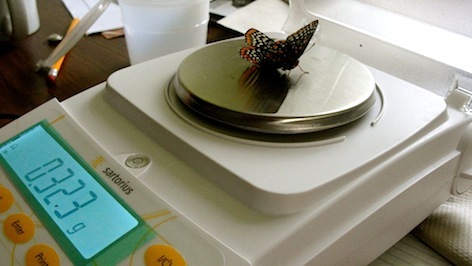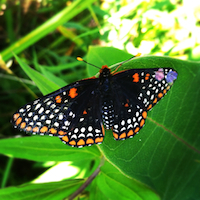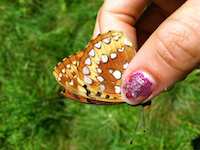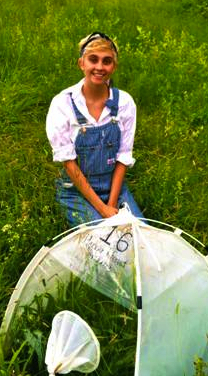
Iowa State student Aubrie James weighs a butterfly in the Harvard Forest research laboratory.
AMES, Iowa — Aubrie James set her sights on attending a math and ecology summer program in Michigan. But her academic adviser at Iowa State University recommended she aim a bit higher and apply for a competitive National Science Foundation research program for undergraduates. Not wanting to disappoint him, James applied for "the best looking one" she felt sure she wouldn't get into -- the Harvard Forest Program in Ecology at Harvard University.
Funny thing happened, though. James was accepted.

Baltimore Checkerspot
Now the Iowa State University animal ecology senior from Ames is having the time of her life. James is part of a research team studying butterfly dispersal in diverse environments. Their ultimate goal is to better understand how landscape change impacts population dynamics. James' group is looking specifically at the butterfly species Baltimore Checkerspot (Euphydryas phaeton.)
In June, James wrote in the Harvard Forest blog, "It's going to be really busy this summer, both in the field and in the lab, but this is the best gig on the planet. I'm learning. I'm researching. I get to hang out with geniuses every day ... "
Stiff competition
Established in 1907, the Harvard Forest is a 3,500-acre laboratory and classroom for research and education in forest biology, ecology and conservation. During the 11-week summer program, research focuses on the effects of natural and human disturbances on forest ecosystems. The 20-year-old program is funded by the National Science Foundation, NASA and several universities.
This year, 30 students were chosen from a highly competitive pool of more than 500 applicants. Each student works with a faculty mentor to complete an independent project during the summer, and presents his or her work at an annual research symposium. During the academic year, students often continue working with their mentors to publish their results in scientific papers, honors theses or conference abstracts.
A great fit
James applied specifically for the butterfly project, one of several under way this summer. She is working with Greg Breed, postdoctoral fellow, and Elizabeth Crone, senior ecologist.
"They're interested in understanding patterns of animal movement and using data collected in the field to construct and refine mathematical models of animal movement," James said. "Similarly, I'm interested in using mathematical tools to understand ecological patterns. I also like animals that fly and their movement, so it's been a great fit."

James' group is looking at the morphological (weight, length, wingspan, etc.) differences between two populations of the Baltimore Checkerspot that are distinguished by their different food sources. One relies on a native host plant in decline, and the other is sustained by a weedy invasive host plant. James is trying to understand if any morphological variations between the populations can be attributed to the different host plants.
"Preliminary results suggest that there are," she said. "These morphological differences relate to flight and dispersal ability, which may inform how the species as a whole will respond to a changing environment (with respect to host plant abundance)."
Well prepared
For James, the best part of the program is being "in the company of extremely talented individuals."
"The whole suite of my Harvard Forest colleagues (other students, their mentors, the program directors) makes the environment incredibly conducive to intellectual growth," James said.
And, while previous coursework enabled her to attain the "best gig on the planet," James says Iowa State has supported her with something even more valuable.
"I have a network of extremely helpful and wonderful people at Iowa State who have gone a step further and provided the intangibles: openness, inclusiveness, encouragement, intellectual stimulation," James said.
"It's the environment of consistent encouragement of intellectual growth at ISU that I appreciate and that has prepared me extremely well for my time at Harvard Forest."
James says she is returning to Iowa State this fall with "a more refined educational focus, a deeper understanding of ecology and a clearer idea of how to conduct research." After graduation in December, she's headed for graduate school, a Ph.D. in ecology and a career as a research ecologist at an academic institution.
